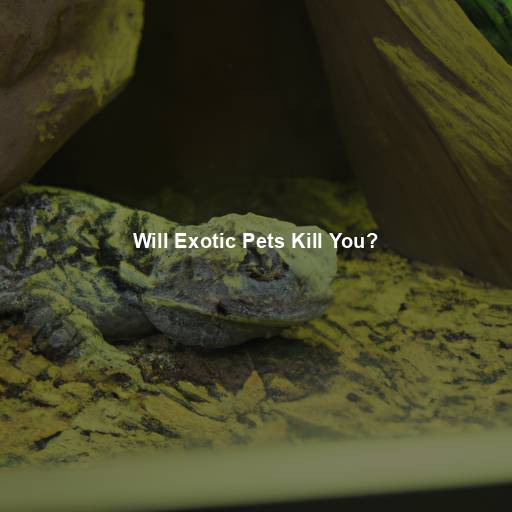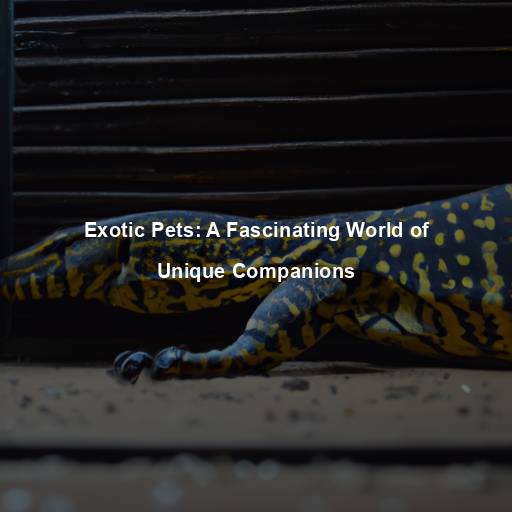Will Exotic Pets Kill You?
Last Updated on November 14, 2023 by Evan
Contents [hide]
- 1 The Fascination with Exotic Pets
- 2 The Appeal of Exotic Pets
- 3 The Dark Side of Exotic Pet Ownership
- 4 The Controversy Surrounding Exotic Pet Ownership
- 5 The Importance of Responsible Breeding and Conservation Efforts
- 6 The Role of Legislation and Regulation
- 7 Exploring Alternative Ways to Experience Exotic Animals
- 8 Nurturing the Fascination with Exotic Pets Responsibly
- 9 Embracing the Wonder, Respecting the Wild
- 10 The Ethical Dimensions of Exotic Pet Ownership
- 11 The Role of Conservation in Exotic Pet Ownership
- 12 The Importance of Responsible Pet Trade Regulations
- 13 Exploring Alternatives to Exotic Pet Ownership
- 14 FAQs: Will Exotic Pets Kill You
- 14.1 Can exotic pets actually kill humans?
- 14.2 Are there particular exotic pets that are more dangerous than others?
- 14.3 What are the risks of keeping exotic pets?
- 14.4 Can you tame an exotic pet to eliminate the risk of aggression?
- 14.5 How can I ensure the safety of myself and others when keeping an exotic pet?
The Fascination with Exotic Pets
Exotic pets have long captivated the human imagination, offering a glimpse into the mysterious and untamed world of creatures that exist beyond our everyday lives. From majestic big cats to colorful reptiles, the allure of owning an exotic pet is undeniable. However, amidst the excitement and wonder, it is essential to recognize the potential dangers and risks associated with these unconventional companions. In this article, we will explore the question, “Will exotic pets kill you”?
The Appeal of Exotic Pets
A Unique Connection
There’s a special allure to exotic pets that captivates us, an innate longing for an extraordinary bond with creatures from a realm outside our common encounters with domesticated companions. The notion of intertwining our lives with beings so distinct from the everyday norm is undeniably captivating, beckoning us towards a sense of fascination and intrigue.
Status and Prestige
With their unique appeal and mystique, exotic pets have become a captivating emblem of wealth and influence. The allure lies in the ability to showcase one’s social standing through these extraordinary companions. Yet, amidst the allure and prestige, it is paramount to prioritize the welfare of these captivating creatures above personal gain or societal validation. After all, their happiness should never be compromised for the sake of status.
The Dark Side of Exotic Pet Ownership
Legal and Ethical Considerations
Exploring the perilous realm of exotic pets demands our undivided attention as we navigate the intricate labyrinth of legal and ethical complexities. The veritable tapestry of regulations governing such peculiar companions traverses nebulous borders, transforming with every step we take. Our responsibility lies in unearthing the enigmatic landscape of laws and stipulations, assiduously acquainting ourselves with the ever-shifting portrait of regional nuances. Only through this arduous journey can we begin to fathom the implications of inviting the exotic into our sanctuaries.
Additionally, the ethical implications of capturing and breeding exotic animals for the pet trade cannot be ignored. Many exotic species are taken from their natural habitats, leading to a decline in their populations and disrupting delicate ecosystems. Supporting responsible breeders and conservation efforts is crucial to ensure the well-being of these magnificent creatures.
Safety Concerns and Potential Risks
Owning an unconventional pet surely has its charms, but let’s not disregard the lurking complexities and uncertainties. It’s crucial to recognize that while not every exotic creature poses an immediate danger, there are certain species that possess an unpredictable and potentially hazardous nature. When their primal instincts clash with substandard habitats or insufficient guidance, the potential for life-altering situations cannot be underestimated.
Discover a trove of curious creatures that have sparked both intrigue and trepidation among pet enthusiasts. Delve into the enigmatic world of exotic pets, where safety concerns and potential risks intertwine. Uncover a captivating array of unconventional companions that defy conventional norms, igniting a medley of emotions ranging from fascination to trepidation. Brace yourself for a rollercoaster ride of bewilderment and bewitchment as we explore these remarkable creatures that blur the lines between curiosity and caution.
Unleashing the untamed wilderness within, majestic creatures like tigers, lions, and their feline counterparts captivate us with their raw power and beauty. However, beneath their regal exterior resides an unpredictable nature that defies domestication. Tragedy strikes when the line between admiration and vulnerability blurs, leaving a trail of injuries and even deaths in its wake, reminding us of the untamed spirit these magnificent beasts possess.
In a world filled with an intriguing array of creatures, there exists a group that both fascinates and terrifies: venomous reptiles. From the slithering snakes to the formidable scorpions, their presence can evoke a mix of wonder and trepidation. However, it’s important to approach these mesmerizing creatures with caution, for a mere provocation or mishandling can unleash a cascade of consequences, ranging from debilitating health complications to the ultimate tragedy – death itself.
- Primates: Primates, such as chimpanzees or monkeys, have immense strength and intelligence, making them potentially dangerous pets. Their behavior can be unpredictable, and their physical capabilities can cause harm if not properly controlled.
When it comes to mesmerizing creatures, large constrictor snakes undoubtedly take the spotlight. Their majestic size and formidable strength, however, can bring about unexpected dangers for both their owners and those in close proximity. Worrisome reports of incidents involving suffocation or injuries have emerged, particularly when these magnificent serpents manage to slip away or are mishandled.
Responsible Ownership and Expert Guidance
When venturing into the realm of exotic pet ownership, it becomes imperative to embrace the concept of responsible stewardship and to actively seek the invaluable guidance of experts who have traversed this enigmatic path before. Delving into the world of unconventional pets necessitates careful consideration and meticulous planning, as you navigate the intriguing and alluring intricacies of this unique domain. By fully immersing oneself in the etiquette of responsible ownership, the journey of fostering an extraordinary bond with these extraordinary creatures becomes an awe-inspiring pursuit worth embarking upon.
-
Extensive Research: Before bringing an exotic pet into your home, conduct thorough research about the species, their specific care requirements, and potential risks associated with their ownership.
-
Secure Enclosures: Providing a safe and appropriate living environment is paramount. Ensure that enclosures are secure, spacious, and equipped to meet the specific needs of the exotic pet.
Caring for exotic pets entails a whole new level of responsibility, as their unique needs demand specialized veterinary care. It is of utmost importance to locate and build a strong connection with a veterinarian who possesses abundant experience in treating and nurturing the particular species you plan on welcoming into your home. By proactively seeking out this crucial alliance, you can ensure the well-being and longevity of your extraordinary companion.
- Behavioral Training: Seek professional guidance to ensure proper training and socialization of your exotic pet. This will help mitigate potential risks and ensure a harmonious relationship between owner and animal.
The Power of Responsibility
Caring for an exotic pet requires a high level of responsibility and commitment. The process of meeting their specific needs, providing appropriate nutrition, and ensuring their overall well-being can create a strong sense of purpose and fulfillment for the owner. This responsibility fosters personal growth and a deep understanding of the complexities of the natural world.
The Controversy Surrounding Exotic Pet Ownership
Ethical Concerns
The debate surrounding the ethical implications of exotic pet ownership is multifaceted. Critics argue that removing animals from their natural habitats and subjecting them to captivity for human pleasure is inherently unethical. It disrupts their natural behaviors, compromises their physical and psychological health, and perpetuates a cycle of exploitation.
Conservation and Education
While some may disagree, there are those who strongly advocate for the ownership of exotic pets, highlighting the potential benefits they can bring to conservation and education efforts. These individuals argue that through responsible breeding programs and well-established sanctuaries, endangered species can find refuge and even thrive. Furthermore, they assert that educational initiatives centered around exotic pets can spark curiosity and instill a profound appreciation for the incredible variety of life on our planet. The discourse surrounding this topic remains complex and multifaceted, leaving us with much to ponder and deliberate upon.
The Importance of Responsible Breeding and Conservation Efforts
Supporting Responsible Breeders
In the ever-evolving world of exotic pets, a select group of dedicated breeders stands out as guardians of animal welfare and species preservation. These virtuosos of the breeding realm put the health and genetic kaleidoscope of their prized creatures at the forefront, embracing a sacred duty of care with unyielding resolve. Through their relentless adherence to rigorous standards and unwavering commitment to socialization, responsible breeders offer a glimmer of hope in the vast wilderness of the exotic pet industry. By rallying behind these noble breeders, individuals can partake in a transformative journey towards sustainability and ethical stewardship.
Conservation Initiatives
Preserving the ethereal beauty of exotic species in their natural abodes and reducing the demand for animal captivity necessitate resolute conservation endeavors. Numerous dedicated organizations persistently toil to safeguard delicate ecosystems, combat the illicit trade of wildlife, and advocate for sustainable approaches. By endorsing and actively partaking in these passionate initiatives, individuals hold the power to forge a substantial influence in fortifying the very existence of these extraordinary creatures.
The Role of Legislation and Regulation
Addressing the Legal Landscape
Laws and regulations regarding exotic pet ownership vary greatly across different jurisdictions. Some countries have comprehensive bans on certain species, while others impose strict requirements for permits and licensing. The intent behind these regulations is to ensure the welfare of both the animals and the public, preventing the potential risks associated with owning exotic pets.
Balancing Public Safety and Individual Freedom
The debate surrounding exotic pet legislation often centers around striking a balance between public safety concerns and individual freedoms. Advocates for stricter regulations argue that the potential dangers posed by certain species outweigh personal desires, emphasizing the need to protect both humans and animals. Opponents highlight the importance of personal choice and responsibility, arguing that education and awareness should be prioritized over blanket bans.
Exploring Alternative Ways to Experience Exotic Animals
Sanctuaries and Rescues
Step into the captivating world of wildlife and immerse yourself in a truly extraordinary experience. Unlock the gateway to a realm that teems with enigmatic creatures, without the encumbrance of actually owning them. Journey to sanctuaries and rescue centers, where vulnerability and redemption merge harmoniously, offering a rare opportunity to witness exotic species in an ethical and secure setting.
Ecotourism and Wildlife Conservation
Ecotourism initiatives focused on wildlife conservation offer a unique opportunity to witness exotic animals in their natural habitats. Responsible ecotourism practices prioritize the well-being of the animals and contribute to local conservation efforts. By participating in these experiences, individuals can gain a deeper appreciation for the beauty and importance of preserving the natural world.
Nurturing the Fascination with Exotic Pets Responsibly
Education and Awareness
Owning exotic pets comes with its own set of challenges and responsibilities that cannot be taken lightly. Each species has its own unique needs and behaviors that must be understood before making a decision. It is essential that individuals stay well-informed and educate themselves about the intricate intricacies of exotic animals in order to provide optimal care and minimize potential risks. With a continuously evolving knowledge base, pet owners can ensure they are making informed choices that prioritize the well-being of their beloved companions.
Responsible Pet Ownership
Responsible pet ownership extends beyond the basics of providing food, shelter, and medical care. It involves a commitment to lifelong learning, adapting to the evolving needs of the animal, and ensuring their physical and emotional well-being. By embracing responsible ownership practices, individuals can create a safe and enriching environment for their exotic pets.
Embracing the Wonder, Respecting the Wild
The question of whether exotic pets will kill you is not a straightforward one. While certain species may possess inherent dangers, responsible ownership, education, and adherence to regulations can mitigate potential risks. It is essential to approach exotic pet ownership with respect, understanding, and a commitment to the well-being of both the animal and the owner. By nurturing our fascination with exotic pets responsibly, we can celebrate the beauty and diversity of the animal kingdom while preserving the delicate balance of the natural world.
Unique Connections and Unconditional Love
The bond that can be forged between an owner and their exotic pet is simply awe-inspiring. These rare and extraordinary animals have an uncanny ability to connect with their human counterparts on a deep and profound level, leaving us perplexed and amazed at the intensity of their emotional capacity. The joy and fulfillment that comes from nurturing and cherishing an exotic pet knows no bounds, as the love and companionship they offer is truly one of a kind. It is through these unique and profound connections that owning an exotic pet becomes an enriching and inexplicably magical experience.
Expanding Our Understanding of the Natural World
Exotic pets provide an opportunity to expand our understanding of the natural world and appreciate its vast diversity. By observing and interacting with these remarkable animals up close, we gain insights into their behaviors, survival strategies, and the intricate web of life. This firsthand experience fosters a deep respect and appreciation for the delicate balance of ecosystems and the importance of conservation.
The Ethical Dimensions of Exotic Pet Ownership
Balancing Personal Desire and Animal Welfare
The ethical dimensions of owning an exotic pet are complex and multifaceted. While the desire to share our lives with these fascinating creatures is understandable, we must consider the potential impact on their well-being. Captivity can pose significant challenges to the physical and psychological health of exotic animals, often leading to stress, behavioral issues, and restricted natural behaviors.
Responsible Ownership and Proper Care
When it comes to owning exotic pets, considering the ethical implications can leave us feeling a little bewildered. However, one thing remains clear: responsible ownership and compassionate care must take center stage. By creating a living space that replicates their natural habitat, providing a nutritionally balanced diet, and seeking expert veterinary attention, we can navigate the perplexing path of exotic pet ownership with a conscientious approach. With these measures in place, we can evolve toward a more ethically sound relationship with these extraordinary creatures.
The Role of Conservation in Exotic Pet Ownership
Conservation Breeding Programs
Responsible breeders and conservation organizations play a crucial role in preserving endangered species and maintaining genetic diversity. Conservation breeding programs aim to prevent the depletion of wild populations by carefully managing captive populations and reintroducing individuals into their natural habitats where possible. Supporting these programs can contribute to the long-term survival of exotic species.
Public Awareness and Education
Exotic pets can serve as ambassadors for their wild counterparts, inspiring public interest and raising awareness about the importance of conservation. Through educational initiatives and public outreach programs, individuals can learn about the challenges facing exotic species in the wild and the actions they can take to protect their habitats. By fostering a sense of empathy and understanding, we can create a more conservation-conscious society.
The Importance of Responsible Pet Trade Regulations
Preventing Illegal Wildlife Trafficking
The exotic pet trade is often linked to illegal wildlife trafficking, a devastating practice that threatens the survival of many species. Strict regulations and enforcement are necessary to combat this illicit trade, safeguarding vulnerable animals from exploitation and ensuring their populations remain intact in their natural habitats. By supporting and advocating for strong regulations, we can contribute to the fight against this global issue.
Encouraging Ethical Practices and Standards
Responsible pet trade regulations should also focus on promoting ethical practices and standards within the industry. This includes ensuring that animals are bred in captivity rather than taken from the wild, prioritizing the health and welfare of the animals, and providing transparency in the sourcing and selling of exotic pets. By supporting businesses that adhere to these standards, we can help shape a more ethical pet trade industry.
Exploring Alternatives to Exotic Pet Ownership
Volunteer Work and Conservation Projects
For those who have a deep fascination with exotic animals but are hesitant to own them as pets, getting involved in volunteer work and conservation projects can be a rewarding alternative. Many organizations offer opportunities to work closely with exotic animals in a controlled and ethical environment, contributing to their well-being and conservation efforts. This allows individuals to satisfy their passion while supporting the animals’ overall welfare.
Wildlife Photography and Documentaries
Another way to engage with exotic animals responsibly is through wildlife photography and documentaries. By capturing their beauty and sharing their stories, photographers and filmmakers can raise awareness about the challenges they face in the wild. These visual mediums allow individuals to appreciate the magnificence of exotic species without the need for direct ownership.
FAQs: Will Exotic Pets Kill You
Can exotic pets actually kill humans?
While it is possible for exotic pets to pose a threat to humans, the likelihood of being killed by one is relatively low. Exotic pets, just like any other animal, can become aggressive or defensive if they feel threatened or improperly handled. However, if proper care, training, and precautions are taken, the majority of exotic pets can be safely kept without posing a significant danger to humans.
Are there particular exotic pets that are more dangerous than others?
Some exotic pets do have the potential to be more dangerous due to their size, strength, or predatory nature. Large carnivorous animals such as big cats, large constrictor snakes, and certain primates can be more challenging to handle and may present a higher risk if not properly secured, trained, or supervised. It is crucial to thoroughly research the specific species you are considering as an exotic pet and be aware of their potential dangers before making a decision.
What are the risks of keeping exotic pets?
Keeping exotic pets involves various risks, including potential injury or aggression towards humans. Exotic pets may carry zoonotic diseases (diseases that can be transmitted between animals and humans), which can pose health risks if proper hygiene and preventive measures are not followed. Additionally, some exotic pets have specific dietary or environmental requirements that can be difficult to meet in a domestic setting, leading to stress, illness, or other complications. It is vital to educate yourself about the specific needs and potential risks associated with the exotic pet you are interested in.
Can you tame an exotic pet to eliminate the risk of aggression?
In the realm of animal companionship, treading into the world of exotic pets demands careful contemplation. Despite our best efforts in training and domestication, these creatures bear the remnants of their untamed lineage, inherently shrouded in enigmatic behaviors and primal inclinations. While some may harbor dreams of eliminating the risks associated with aggression or capriciousness, the truth remains that the essence of the wild can never be eradicated. Mastering the art of taming such remarkable beings requires a profound repository of knowledge, hands-on experience, and an unyielding commitment to ongoing training, all while preserving the sanctity of their untamed instincts. Entrusting the well-being of these captivating animals calls for collaboration with seasoned professionals – trainers and veterinarians who have dedicated their expertise to the realm of exotics – thus ensuring a harmonious existence between caretakers and their enigmatic companions.
How can I ensure the safety of myself and others when keeping an exotic pet?
To ensure the safety of yourself and others when keeping an exotic pet, there are several precautions you should take. Firstly, thoroughly research the specific species and evaluate whether its needs align with your capabilities and living environment. Provide proper housing, nutrition, and enrichment to minimize stress and potential aggression. Regular veterinary check-ups are essential to identify any health issues or zoonotic diseases. Additionally, never underestimate the animal’s natural instincts and always follow safety guidelines, including secure enclosures, responsible handling, and limited contact with the public.
It is important to note that laws and regulations regarding exotic pet ownership vary between countries and regions. Before obtaining an exotic pet, ensure you are compliant with all relevant legal requirements and permits to avoid potential legal issues and to promote the welfare of the animals themselves.







